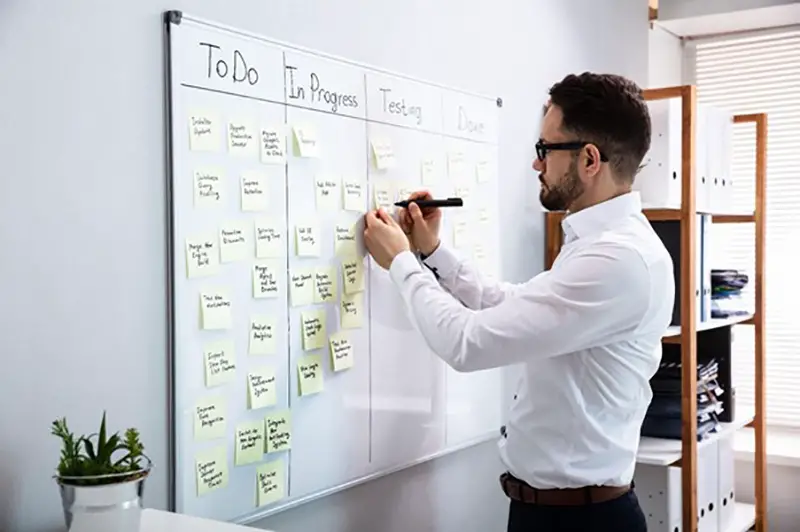Click here to get this post in PDF
While project management models differ between businesses, there’s no right or wrong solution: instead, it’s important to choose a methodology that works perfectly for you. Although waterfall management has been used more traditionally in the business world, agile is now growing in popularity across multiple sectors, thanks to the flexibility and innovation it can help to bring about.
Deciding which methodology to follow depends on the timeframe and scale of your project, as well as how involved your clients want to be and how defined your end goals are. Ultimately, the best project management model for your business depends on the kind of products your business will deliver, as well as the benefits and disadvantages each could bring. Agile consulting teams like Fractal Systems work in partnership with you to ensure your entire organisation has a strong understanding of project delivery processes and allowing you to work as efficiently and innovatively as possible.
Creativity: How Innovative Is Each Method?
For projects that involve more creative thinking or have the space to become more flexible as time goes on, agile allows your team the innovation they need. Allowing the lifecycle of a project to change length as the discovery process goes on means your team can focus on delivering the most effective, highest-quality result possible without the worry of concrete deadlines to fall short of. It’s worth noting, though, that agile working capabilities still require a strong form of leadership; without any timeframes or leadership in place, productivity could drop.
While waterfall project management allows some room to manoeuvre, its’ focus on set deadlines and timeframes mean your team might feel more stifled, and produce lower-quality work in order to reach deadlines on time. However, more sequential projects that require less creative input may benefit from this approach, allowing teams to work together to reach deadlines with little room for misunderstanding.
Accountability: How Does Each Method Reach the End Goal?
For more creative projects in which results can be difficult to lay out in black and white, accountability offers reassurance to clients, as well as key stakeholders and your organisation’s leadership team. While agile and waterfall methods both ensure accountability is built into their project management methods, they do so in different ways.
Agile working prioritises communication and collaboration between every member of the team. Because of this, liaisons and communications with clients are embedded at every stage, meaning issues can be picked up and resolved quickly, and feedback cycles can happen a lot more seamlessly.
On the other hand, waterfall utilises set deadlines, with feedback time at the end of every stage of the project lifecycle. While this ensures your team can work on your final delivery in line with goals set at the very first stage of development, it leaves little room for any changes in budget, direction or end goal to be made. If the end result doesn’t align with the product your client has in mind, this approach can lead to a huge loss in time and money being spent in order to deliver.
Risk: How Does Each Method Ensure Expected Results?
Founded within risk-heavy software development, agile ensures teams can adapt and restructure in order to overcome any unexpected issues during the project lifecycle. Focusing on shorter bursts of more frequent delivery means no stage of development goes by without your clients or colleagues becoming misinformed, or the final project producing unexpected results.
Rather than utilising this flexibility, traditional waterfall methods instead map out delivery within the very first stage. While waterfall methods take time to plan every potential scenario as far as possible, agile works on the basis that expectations will change as the project lifecycle continues, and can be completed as a result of constant communication and collaboration.
Employee Satisfaction: How Does Each Method Impact Your Team?
One of the most important factors when it comes to integrating a project management style within your business is how well your team reacts and responds to it. In order for a new project management approach to be as effective as possible, your whole organisation should feel motivated, inspired and equipped with all the tools they need to carry out the best work possible. While employees used to operating within traditional working structures might prefer a top-down waterfall approach, teams focusing on personal growth alongside value delivery would benefit from the flexibility and streamlined productivity agile can bring about.
You may also like: Why Agile Training is Crucial for Every Software Development Team
Image source: Depositphotos.com

